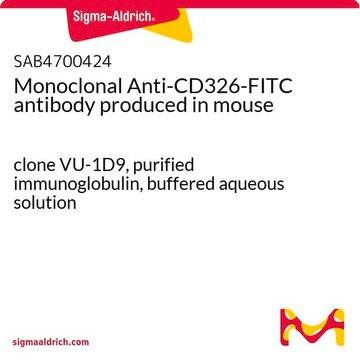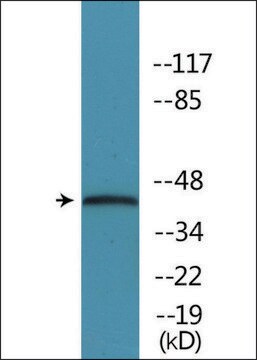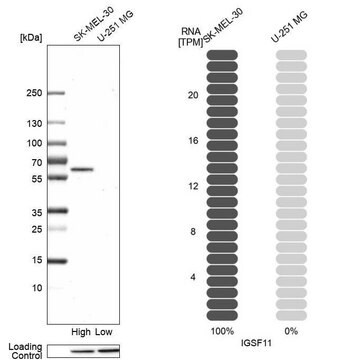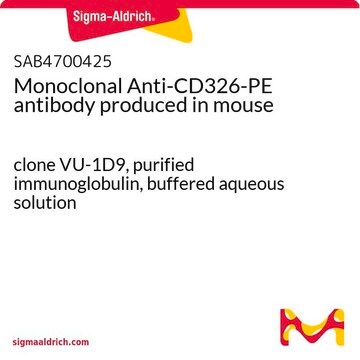SAB4700423
Monoclonal Anti-CD326 antibody produced in mouse
clone VU-1D9, purified immunoglobulin, buffered aqueous solution
Sinónimos:
Anti-EPCAM
Iniciar sesiónpara Ver la Fijación de precios por contrato y de la organización
About This Item
UNSPSC Code:
12352203
NACRES:
NA.41
Productos recomendados
biological source
mouse
Quality Level
conjugate
unconjugated
antibody form
purified immunoglobulin
antibody product type
primary antibodies
clone
VU-1D9, monoclonal
form
buffered aqueous solution
species reactivity
human
concentration
1 mg/mL
technique(s)
western blot: suitable
isotype
IgG1
NCBI accession no.
UniProt accession no.
shipped in
wet ice
storage temp.
2-8°C
target post-translational modification
unmodified
Gene Information
human ... EPCAM(4072)
Categorías relacionadas
General description
Epithelial cell adhesion molecule (EpCAM) or cluster of differentiation 326 (CD326) is encoded by the 14 kb GA733-2 gene mapped to human chromosome 2p21. Human EpCAM expression is restricted to epithelia of colon, small intestine, lung, kidney, thymus, liver, pancreas, stomach. It is also expressed in several cancers, progenitor and stem cells. CD326 is a transmembrane glycoprotein characterized with an ectodomain, one transmembrane domain, and a 26 residual cytoplasmic domain.
The mouse monoclonal antibody VU-1D9 recognizes an epitope within EGF-like domain I of CD326 / EpCAM, a marker of epithelial lineages. This antibody strongly stains various normal epithelial cells and carcinomas.
Immunogen
Small cell lung carcinoma cell line H69
Application
Suggested working dilution for immunoblotting is 1-4 μg/mL of sample. Indicated dilution is recommended starting point for use of this product. Working concentrations should be determined by the investigator.
Biochem/physiol Actions
Epithelial cell adhesion molecule (EpCAM, CD326) is a transmembrane glycoprotein, involved in several cellular functions, such as epithelial-specific intercellular cell–adhesion, cell signaling, migration, proliferation and differentiation. EpCAM is a dominant surface antigen mapped on human colon carcinoma. It has potential as a diagnostic marker for several carcinomas, including epithelial ovarian cancer (EOC). EpCAM is considered to be a potential target for cancer treatment. EpCAM with the help of components of wnt signal transduction pathway plays a vital role in stem cell signaling.
Features and Benefits
Evaluate our antibodies with complete peace of mind. If the antibody does not perform in your application, we will issue a full credit or replacement antibody. Learn more.
Physical form
Solution in phosphate buffered saline, pH 7.4, with 15 mM sodium azide.
Disclaimer
Unless otherwise stated in our catalog or other company documentation accompanying the product(s), our products are intended for research use only and are not to be used for any other purpose, which includes but is not limited to, unauthorized commercial uses, in vitro diagnostic uses, ex vivo or in vivo therapeutic uses or any type of consumption or application to humans or animals.
¿No encuentra el producto adecuado?
Pruebe nuestro Herramienta de selección de productos.
Optional
Referencia del producto
Descripción
Precios
Storage Class
10 - Combustible liquids
flash_point_f
Not applicable
flash_point_c
Not applicable
Elija entre una de las versiones más recientes:
¿Ya tiene este producto?
Encuentre la documentación para los productos que ha comprado recientemente en la Biblioteca de documentos.
Chikako Zen et al.
Liver transplantation : official publication of the American Association for the Study of Liver Diseases and the International Liver Transplantation Society, 17(8), 943-954 (2011-04-15)
We investigated the phenotype of hepatocellular carcinoma (HCC) in livers removed during transplantation after local ablation therapy by transarterial chemoembolization (TACE). This study involved 80 HCC nodules (40 treated with TACE and 40 not treated with local ablation before transplantation)
Na Li et al.
Cancer management and research, 11, 10939-10948 (2020-02-06)
Circulating tumor cell (CTC) detection methods based on epithelial cell adhesion molecule (EpCAM) have low detection rates in epithelial ovarian cancer (EOC). Meanwhile, folate receptor alpha (FRα) has high expression in EOC cells. We explored the feasibility of combining FRα
Carlo Patriarca et al.
Cancer treatment reviews, 38(1), 68-75 (2011-05-18)
Epithelial cell adhesion molecule (EpCAM, CD326) is a pleiotropic molecule that potentially offers therapeutic applications in cancer treatment. Initially described as a dominant surface antigen on human colon carcinoma, it is a transmembrane glycoprotein mediating epithelial-specific intercellular cell-adhesion. Recent data
Luojun Chen et al.
Scientific reports, 8(1), 1188-1188 (2018-01-21)
Circulating tumor cells (CTCs) provide a new approach for auxiliary diagnosis, therapeutic effect evaluation, and prognosis prediction for cancer patients. The epithelial cell adhesion molecule (EpCAM)-based separation method (CellSearch) showed good clinical use in multiple types of cancer. Nevertheless, some
Graham Carpenter et al.
Cancer cell, 15(3), 165-166 (2009-03-03)
The epithelial-specific cell adhesion molecule (EpCAM) modulates cell adhesion and proliferation. Its overexpression correlates with tumor cell proliferation, and EpCAM is a therapeutic target. In the February issue of Nature Cell Biology, Maetzel et al. demonstrate that proliferative responses to
Nuestro equipo de científicos tiene experiencia en todas las áreas de investigación: Ciencias de la vida, Ciencia de los materiales, Síntesis química, Cromatografía, Analítica y muchas otras.
Póngase en contacto con el Servicio técnico








